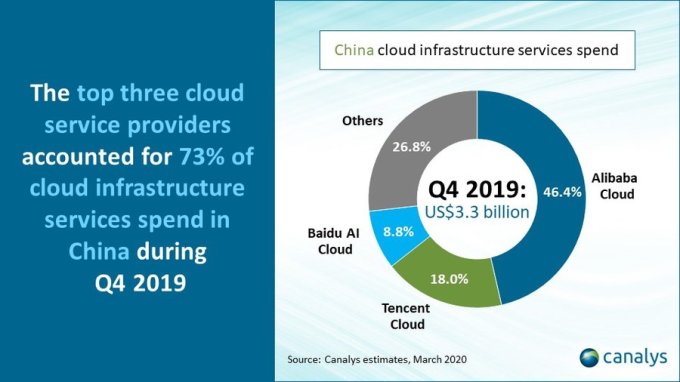17 Mar Chinese cloud infrastructure market generated $3.3B in Q42019
Research firm Canalys reports that the Chinese cloud infrastructure market grew 66.9% to $3.3 billion in the last quarter of 2019, right before the COVID-19 virus hit the country. China is the second largest cloud infrastructure market in the world, with 10.8% share.
The quarter puts the Chinese market on a $13.2 billion run rate. Canalys pegged the U.S. market at $14 billion for the same time period, with a 47% worldwide market share.
Alibaba led the way in China, with more than 46% market share. Like its American e-commerce giant counterpart, Amazon, Alibaba has a cloud arm, and it dominates in its country much the same way AWS does in the U.S.
Tencent was in second, with 18%, roughly the equivalent of Microsoft Azure’s share in the U.S., and Baidu AI Cloud came in third, with 8.8%, roughly the equivalent of Google’s U.S. market share.

Slide: Canalys
Matthew Ball, an analyst at Canalys, says the fourth quarter numbers predate the medical crisis due to the COVID-19 outbreak in China. “In terms of growth drivers for Q4, we have seen the ongoing demand for on-demand compute and storage accelerate throughout 2019, as private and public organizations embark on digital transformation projects and start building platforms and applications to develop new services.”
Ball says gaming was a big cloud customer, as was healthcare, finance, transport and industry. He also pointed to growth in facial recognition technology as part of the smart city sector.
As for next year, Ball says the firm still sees big growth in the market despite the virus impact in Q12020. “In addition to the continuation of digital projects once business returns to normality, we anticipate many businesses new to using cloud services during the crisis will continue use and become paying customers,” he said. The cloud companies have been offering a number of free options to businesses during the crisis.
“The overall outcome of current events around the world will be that companies will assess their business continuity measures and make sure they can continue to operate if events are ever repeated,” he said.
Sorry, the comment form is closed at this time.